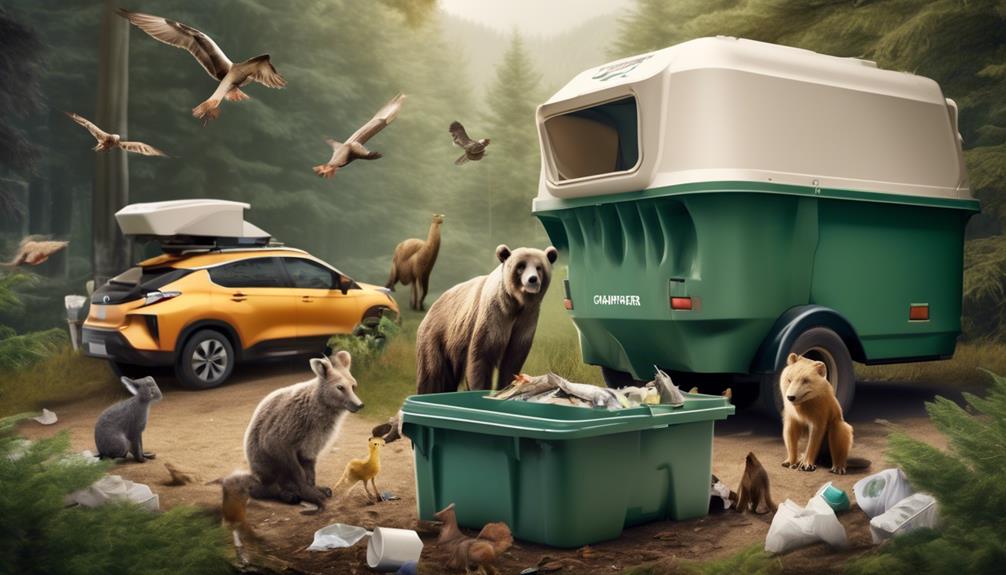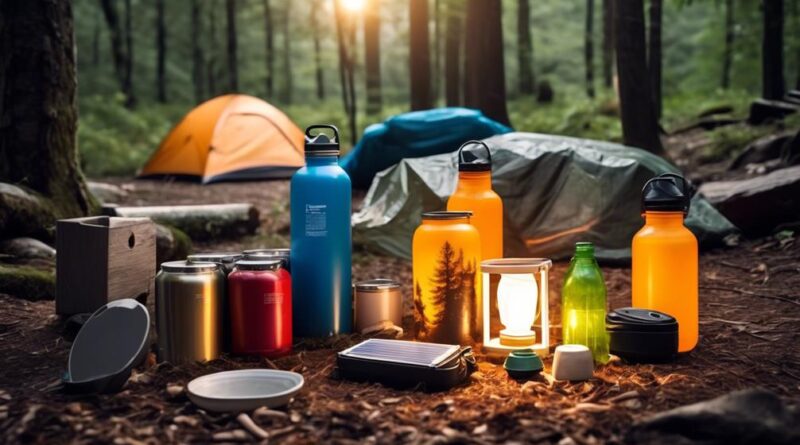6 Best Eco-Friendly Camping Practices for Outdoor Enthusiasts
As you pitch your tent in the heart of nature, the crackling fire and the starry sky above, you become one with the great outdoors. But as an environmentally-conscious camper, you understand that harmonizing with nature goes beyond just enjoying its beauty.
Adopting eco-friendly camping practices is not only a way to preserve the pristine landscapes you love, but also a means to ensure that future generations can experience the same natural wonders.
In this discussion, we will explore six best practices that will help you minimize your impact on the environment while maximizing your enjoyment of the great outdoors.
Leave No Trace Principles

Follow these Leave No Trace principles to minimize your impact on the environment while camping.
First, always plan ahead and prepare. This means knowing the regulations and special concerns for the area you'll be visiting. Check the weather forecast and prepare accordingly. Pack the right gear and enough food and water to sustain you for the duration of your trip.
When setting up camp, choose a durable surface and keep your campsite small. This minimizes the impact on the surrounding area. Remember to dispose of waste properly, packing out all trash and leftover food. Leave what you find, so others can enjoy the natural beauty as well.
Respect wildlife by observing from a distance. Don't approach or feed them. Keep your pets under control and avoid wildlife habitats. When exploring, stick to designated trails and routes. This helps preserve the natural environment and prevents unnecessary damage.
Minimize campfire impact by using established fire rings, fire pans, or camp stoves. Always be sure to fully extinguish fires, leaving no trace of your campfire.
Sustainable Camping Gear
When choosing camping gear, prioritize selecting sustainable options to minimize your environmental impact. Look for gear made from eco-friendly materials such as recycled polyester, organic cotton, or hemp. These materials aren't only durable but also have a lower environmental footprint compared to conventional materials. Opt for gear that's produced using environmentally friendly processes and is free from harmful chemicals. Additionally, consider the longevity and multi-functionality of the gear you choose. Investing in high-quality, versatile gear reduces the need for frequent replacements, ultimately reducing waste.
When selecting a tent, prioritize those made from sustainable materials such as recycled or upcycled fabrics. Look for tents with a durable design to ensure longevity and consider the size to accommodate the number of campers. Choose sleeping bags and pads made from recycled or responsibly sourced materials. Insulation made from recycled fibers or natural materials like down or wool is a sustainable choice. For cookware and utensils, opt for durable, reusable options such as stainless steel or bamboo. When it comes to lighting, choose solar-powered or hand-cranked lanterns and flashlights to reduce the reliance on disposable batteries.
Selecting sustainable camping gear not only minimizes your environmental impact but also sets a positive example for fellow outdoor enthusiasts. By making mindful choices, you contribute to the preservation of natural spaces for future generations to enjoy.
Eco-Friendly Cooking Practices

To minimize your environmental impact while camping, prioritize eco-friendly cooking practices by utilizing sustainable and reusable cookware and minimizing waste.
When preparing for your camping trip, opt for cookware made from eco-friendly materials such as stainless steel, cast iron, or ceramic, which are durable and can be used repeatedly. Avoid single-use disposable cookware and instead invest in high-quality, reusable options to reduce the amount of waste generated during your outdoor cooking activities.
When it comes to fueling your camp stove or fire, choose environmentally friendly options such as propane or butane instead of traditional wood or charcoal, which can contribute to deforestation and air pollution. Additionally, consider using a portable solar cooker or a camp stove that can utilize renewable energy sources to minimize your carbon footprint.
In terms of food preparation, plan your meals in advance to ensure you bring only the necessary ingredients, reducing the amount of excess food packaging and waste. Opt for locally sourced and organic produce to support sustainable farming practices and minimize the environmental impact of transporting food long distances.
After cooking, make sure to properly dispose of any food scraps and packaging by recycling or composting whenever possible.
Responsible Waste Management
Consider implementing efficient waste management strategies during your camping trips to minimize environmental impact and leave the natural surroundings unspoiled. Start by bringing reusable containers for food and other supplies to reduce the amount of single-use packaging. When packing, separate your waste into categories such as recyclables, compostables, and general trash. This will make it easier to properly dispose of each type of waste when facilities are available.
Be mindful of what you bring into nature and what you take out. It's crucial to pack out all of your trash, including food scraps, to ensure that the natural environment remains clean and undisturbed. Biodegradable waste, such as fruit peels and uneaten food, should be scattered in a wide area away from water sources to decompose naturally.
Consider investing in a portable trash compactor or collapsible trash receptacles to compact your waste, making it easier to carry and dispose of responsibly. Additionally, bring along biodegradable trash bags, which are designed to break down quickly in the environment, reducing long-term impact.
Lastly, educate yourself on the waste management regulations of the area where you'll be camping. Some locations have specific rules for waste disposal, such as designated recycling areas or strict guidelines for human waste. By understanding and following these regulations, you can help minimize your environmental impact and contribute to preserving the natural beauty of the outdoors.
Respect for Wildlife and Nature

With responsible waste management in mind, demonstrate respect for wildlife and nature by minimizing disturbances to their habitats and adhering to established guidelines for interacting with local flora and fauna. When camping in natural areas, it's important to remember that you're a guest in the home of countless species. Here's how you can show respect for wildlife and nature:
- Keep a safe distance from wildlife: Observe animals from afar and avoid approaching or feeding them. This helps to prevent stress and disruption to their natural behaviors, contributing to their overall well-being and the preservation of their habitat.
- Leave no trace: Pack out all your trash, leftover food, and litter. By leaving the campsite exactly as you found it, you minimize the impact on the environment and reduce the risk of harm to wildlife that may be attracted to leftover food.
- Stay on designated trails: Stick to established paths to avoid trampling on delicate plants and disturbing wildlife. This helps to preserve the natural landscape and ensures that you don't inadvertently harm the habitats of local flora and fauna.
Conservation-Minded Campsite Etiquette
When setting up your campsite, be mindful of your impact on the environment and follow conservation-minded practices to minimize your ecological footprint. Choose an established campsite whenever possible to avoid damaging new areas. Look for a designated spot that's already clear of vegetation and use it to set up your tent. By doing so, you help preserve the surrounding flora and minimize your impact on the ecosystem.
To further reduce your environmental impact, refrain from altering the campsite. Avoid digging trenches or creating new pathways, as these disturbances can harm the natural environment. Instead, adapt to the existing conditions and make use of natural barriers such as fallen trees or large rocks to shield your camp from wind or create privacy. This way, you leave the site undisturbed and help maintain its natural beauty.
In addition, practice Leave No Trace principles by packing out all trash and waste. This includes food scraps, leftover packaging, and any other items that you bring to the campsite. Leaving behind biodegradable waste may still disrupt the local ecosystem and attract unwanted wildlife. By packing out everything you bring in, you ensure that the campsite remains pristine and undisturbed for future visitors.
Frequently Asked Questions
How Can I Minimize My Impact on the Environment While Camping Without Using Any Disposable Products or Single-Use Items?
To minimize your impact on the environment while camping without disposable products or single-use items, focus on reusable gear, pack out all waste, use biodegradable soaps, and leave no trace. Opt for sustainable practices to protect nature.
Are There Any Specific Camping Locations That Are Known for Their Eco-Friendly Practices and Sustainable Initiatives?
You can find specific camping locations known for their eco-friendly practices and sustainable initiatives. Many national and state parks have implemented measures to minimize impact and promote sustainability, making them great choices for environmentally conscious camping experiences.
What Are Some Alternative Methods for Camping That Are More Eco-Friendly Than Traditional Tent Camping?
Consider trying hammock camping or using a lightweight and durable tarp shelter instead of traditional tent camping. These methods minimize impact on the environment and offer a more eco-friendly approach to enjoying the outdoors.
How Can I Incorporate Sustainable and Eco-Friendly Practices Into My Camping Trips if I Have Limited Access to Eco-Friendly Gear and Resources?
If you have limited access to eco-friendly gear and resources, you can still incorporate sustainable practices into your camping trips by minimizing waste, using reusable items, and leaving no trace. It's all about making conscious choices.
Are There Any Specific Guidelines or Resources for Eco-Friendly Camping in Areas With Sensitive Ecosystems or Endangered Species?
When camping in areas with sensitive ecosystems or endangered species, it's important to follow specific guidelines to minimize your impact. Respect local regulations, avoid disturbing wildlife, and use designated campsites to help protect the environment and its inhabitants.
Conclusion
So next time you head out into the great outdoors, remember to follow these eco-friendly camping practices.
- Leave no trace: This means leaving your campsite exactly as you found it, with no trash or evidence of your presence. Pack out all garbage and dispose of it properly.
- Use sustainable gear: Choose camping equipment made from eco-friendly materials, such as recycled or organic materials. Avoid single-use items and opt for reusable alternatives.
- Cook responsibly: Use a camp stove instead of open fires, as they are more efficient and produce less smoke and air pollution. Use biodegradable dish soap and wash dishes at least 200 feet away from water sources.
- Manage waste effectively: Dispose of human waste properly by using designated toilets or digging a cat hole at least 200 feet away from water sources. Pack out toilet paper and sanitary products.
- Respect wildlife: Observe animals from a distance and never feed them. Store food securely to prevent wildlife from becoming habituated to human food.
- Be mindful of conservation at your campsite: Use designated trails and campsites to minimize impact on vegetation. Avoid damaging plants or disturbing natural features.
By incorporating these practices into your camping trips, you can minimize your impact on the environment and help preserve the natural beauty of our outdoor spaces for future generations to enjoy.
Happy camping!
